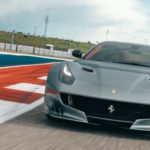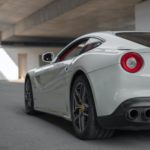A Tribute To: Michael Schumacher- A Formula 1 Racing Legend by Rich Fatuzzo
Article by Rich Fatuzzo
As most of the FOC-SD members know by now, Michael Schumacher had a horrific Ski accident in December of 2013, while skiing with his 14-year old son, Mick, near Meribel in the French Alps. Since the accident, he had endured two major brain operations and even pneumonia and had been in a comatose state for over four months in hospitals in Grenoble, France and Bern, Switzerland. Since then, Michael has been recovering at home in Germany, but his prognosis on his overall well-being is guarded and full recovery is still considered doubtful. Therefore, this Article has been written to give honor to Michael Schumacher, for his prolific Formula 1 Race Wins and his Life-time Racing Achievements and briefly chronicles his life through his years of racing and is meant to highlight Michael (“Schumi”- as he known to his many friends, fans and racing companions) and not necessarily the Teams he raced for or the Cars in which he had raced.
Michael, who was born in Hurth, West Germany in 1969, started his love for racing at the tender age of four, when his father, Rolf, modified his pedal kart with a small motorcycle engine. But after Michael crashed it into a lamppost, his parents enrolled him as the youngest member of the local karting club, where Michael at the age of six won his first karting club championship and then continued to win regional kart races with financial support coming from local businesses and at the age of 14, he won the German Junior Kart Championship and eventually both the German (1985) and European Kart Championships in 1987. In 1988, Michael graduated to racing cars and successfully raced in the German Formula Ford and Formula Konig series, winning the Championship. Due to these successes, he moved up to Formula 3, winning the Title in 1990 and after Michael finished second in a Formula 3000 race in Japan, in 1991, his illustrious Formula 1 racing career began when he was asked to replace another driver on the Jordan-Ford Team for the Belgian Grand Prix. He qualified seventh, but retired on the first lap due to clutch problems with the car. Michael had still impressed enough of the racing community and especially the Benetton-Ford Team who signed Michael to the following race to drive for them.
As a rookie Formula 1 driver, 1991, was sort of a mediocre year for Michael. However, that quickly changed when in 1992, he finished third in the Mexican Grand Prix and then Michael finished in first place in the Belgian Grand Prix. And, by year’s end, Michael finished third in the Driver’s Championship and was only 3 points behind second place, Riccardo Patrese.
In 1994, Michael won the first of his seven Formula 1 Driving Championships by impressively winning six of the first seven races, and then he successfully defended his Title in 1995, becoming the youngest two-time World F1 Champion and he helped the Benetton Team to win its 1st F1 Constructor’s championship. However, due to his overwhelming successes at Benetton, a Ferrari Team that had struggled throughout most of the early 1990s, signed Michael to a contract to race for them in 1996 with several other Benetton Technical Staff also moving over to Ferrari. These major Personnel moves would eventually become not only critical to Michael’s F1 successes, but to Ferrari’s as well, starting with Ferrari winning the Constructor’s Title in 1999.
However, before I highlight some of Michael’s successes with Ferrari and his final stint of Formula 1 racing with Mercedes, I am going to “switch gears” and focus mainly on Michael’s personality on and off the track. If any of our FOC-SD Club Members had the great fortune of watching Michael race over his career, either on Television or especially at several Formula Race Circuits in person, you had to admire his overall level headed personality, but fierce competitive spirit through the practice runs, the qualifying and then under all types of racing conditions, in almost every race that he competed. During his practice runs, but especially in qualifying, Michael seemed to have a “sixth sense” on the many tracks that he raced, and would often qualify in the top ten, but even if he started further back, he would often make up some positions at the beginning of most Formula 1 Races, if his car was competitive and then just seemed to know when to pass where other F1 drivers wouldn’t even consider it. When he had the lead, Michael, throughout his career, also had the ability to push his cars to their limits to maintain such leads from his nearest competitors.
But, some of Michael’s best F1 driving was in those races when the racetracks were wet. Prior to the end of the 2003 Season, Schumacher had won 17 of the 30 races he entered on those wet F1 tracks. He was so good in rain conditions that the media nicknamed him “Regenkonig” and “Regenmeister” which mean Rain King and Rain Master. In 2004, Michael won an astonishing record 12 of the first 13 races and 13 out of a total 18 races for the year, securing his 7th World Championship and 5th in a row, both records to date. During all these Championship years with Ferrari, he always gave credit to his Team, because on a number of occasions, he won because of not only how effective his pit stop times were, but when they were taken during a race. In a few instances, he actually won some races when he was in second place, and then pitted a third time because he was behind slower traffic, changed tires, and then after exiting the pits he was able to pass the race leader on the final few laps.
Along with the good, Michael Schumacher’s racing career, however, was not without some major controversy. Early in his F1 Career, he was twice involved in collisions in the final races of the season that determined the World Championship, in 1994 with Damon Hill and in 1997 with Jacques Villeneuve, when Michael was accused of attempting to cause an accident when Jacques tried to pass him. Schumacher was punished not only for unsportsmanlike conduct, but was then disqualified from the 1997 Drivers’ Championship. And, in the 1998 Canadian Grand Prix, Michael while exiting pit-lane, forced Heinz-Harald Frentzen off the track and into retirement. Even though Michael had received a 10 second penalty, he still won the race. Although there were some other racing incidents over his illustrious career, Michael never failed to admit his mistakes, and accepted whatever penalties he had received with grace and humble apologies.
Except for his admitted racing transgressions, Michael’s racing achievements throughout his career were also reflected off the track and especially in his personal life. In 2004, he helped develop the first lightweight carbon airflow helmet, keeping drivers much cooler during racing. Michael is a special ambassador to UNESCO and had donated about 1.5 million euros to that organization over the years for world child hunger, health and education programs and was named a UNESCO Champion of Sport. In Dakar, Senegal, Michael paid for a school and area improvements. In Sarajevo, he helped build a hospital, specializing in the caring of child amputees from the war there. And, in Lima, Peru, Schumacher funded a Center for a shelter, food and clothing, medical attention and education for homeless street children. Although the exact amount of all of Michael’s contributions is not known, in the last four years that he was a driver for the Mercedes Team, it is estimated that he donated at least $50 million.
Finally, to list all of Michael’s Formula 1 Racing achievements would probably take several more pages, so I will attempt to just highlight Michael’s more significant records:
- 7 FI Championship Titles (1994-95 Benetton; 2000-04 Ferrari); Consecutive Titles- 5
- 91 Race Wins with 13 Wins (72%) in one season- 2004 and 72 for one team- Ferrari
- 8 Wins at the same Grand Prix- France with 22 different Grand Prix won overall
- 8 Poles at the same Grand Prix- Japan; 68 Pole Positions Total
- Total Years and Consecutive Years with a Win- 15 (1992-2004)
- 7 Runner-up Positions in one season- 2006; 43 overall
- Consecutive Top Two Finishes- 15; Brazil 2002 through Japan 2002
- Podiums (Top 3 Finishes)- 155; 17 (100%) in 2002 and 19 from US 2001-Japan 2002
- Front Row Starts- 116; and Fastest Laps- 77 with 10 in one season- 2004
- Doubles (Poles and Wins)- 40; and Hat Tricks (Poles, Wins and Fastest Laps)- 22 with 5 in 2004
- Races with one Team- 181- Ferrari; with 308 races overall- 307 starts
- Career Points: 1,566
- Lifespan of Racing- 1st Race- 1991 Belgian Grand Prix with 1st Win 1992 Belgian G. P.And Last Win- 2006 Chinese Grand Prix; Last Race- 2012 Brazilian Grand Prix
I am sure that we are all saddened by Michael’s skiing accident and his present health condition, but for all of the FOC-SD Members that love to drive your Ferraris, and for those that have enjoyed watching F1 Racing over the years, you have to admire Michael’s Racing Legacy, especially when he raced with the Ferrari Team. And, while driving for Ferrari in 2006, Michael was voted the most popular, Driver of the Season, by all the F1 racing fans.
In his last years as a Driver for Mercedes, Michael served as President for the Grand Prix Drivers’ Association. But, it is interesting to note, that Michael in his own car ownership was very modest, driving mainly a Fiat 500 Abarth and for the family car, a Fiat Croma.
In closing, since I can remember, I have always enjoyed watching Formula 1 Racing and have always rooted for the Ferrari Team to do well. But, when Michael came along, there was something about his fierce competitiveness, but even-tempered personality in all types of racing conditions that I could not help but admire. But, there is one race that, to me, truly identifies Michael’s overall personality and that was the 2006 Italian Grand Prix at Monza, which he won. At the Awards Ceremony, the National Anthems are always played for the Winner first and then for the Constructor (Team’s Car- Home Country), in this case, Italy (Ferrari). So, Michael being German, the National Anthem of Germany was played first, and Michael stood rather stoically as the German National Anthem has more of a march beat to it. But, since the Italian National Anthem, is much more lyrical and borders on light opera, Michael’s smile grew and he started to vigorously wave his arms to the beat of the Italian Anthem during its playing and the fanatical Ferrari Fans “Tifosi” went wild with appreciation. That moment has stuck prominently in my memory and in my admiration for Michael Schumacher, the Driver and Michael Schumacher, the Person.
Finally, when Michael first announced his retirement from Ferrari at the end of the Formula 1, 2006 Season, two renowned F1 Drivers, Niki Lauda and David Coultard hailed Michael Schumacher as the greatest all-around Racing Driver in Formula 1 History.


